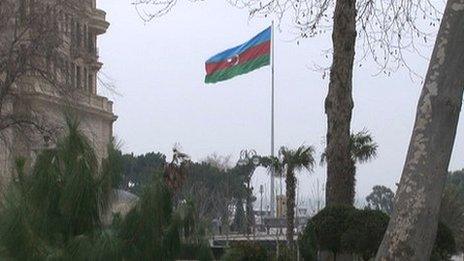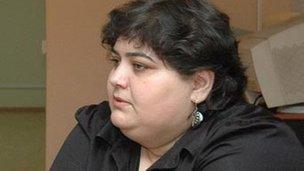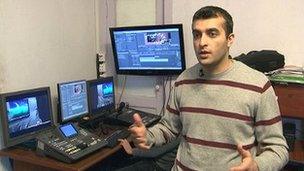Eurovision puts spotlight on Azerbaijan human rights
- Published

As Azerbaijan continues to clamp down on dissent in the run-up to hosting the Eurovision Song Contest in May, the BBC's Caucasus correspondent, Damian McGuinness, asks whether the competition risks being unfairly politicised.
It started with a letter and some photos. The photographs showed journalist Khadija Ismayilova having sex with her boyfriend - they were taken with a hidden camera installed in her bedroom without her knowledge.
And the letter ordered her to stop investigating alleged government corruption. Otherwise, it said, she would be publicly shamed.
Ms Ismayilova, one of Azerbaijan's most respected investigative journalists, refused to give in to the blackmail.
This was a brave decision in a conservative, mainly Muslim country where, although the state is secular, honour killings still take place.
'KGB methods'
The following week, on 14 March, a video showing her having sex, was posted online. It had been filmed with the same secret camera.
At the same time, two pro-government newspapers published articles accusing her of lax morals and alcoholism, and indicating where to find the video on the internet.
"I am sure this was done by someone in the government who has authority," says Ms Ismayilova.

Ms Ismayilova warns that even foreign visitors arriving for Eurovision risk being spied on
She believes the blackmail was aimed at stopping her from reporting on allegations that President Ilham Aliyev's wife and daughters secretly own stakes in the country's banks and one of its biggest telecoms companies.
"They learnt these methods with the KGB. They try to misuse conservative feelings in society," she said.
"They thought this would make me stop my investigations. But I have stood up and talked about it openly. And society has supported me."
Some newspapers refused to join the smear campaign against Ms Ismayilova, and elders within Azerbaijan's Muslim community have publicly given her their support.
The government has denied involvement. A spokesman for President Aliyev, Ali Hasanov, released a statement saying the "right to privacy is a fundamental human right", and said that an investigation has been launched.
A source within the president's office told the BBC that the case was being taken seriously, and that the interior minister is also following the investigation.
But this is not the first time secret videos of a sexual nature have been used to blackmail government critics in Azerbaijan.
Last May, while Azeri opposition activists were holding their own Arab Spring-style protests, sexually explicit footage of two oppositional journalists was broadcast on TV.
Two separate videos showed the two activists engaging in sexual activity in the hotel rooms where they were staying for a conference.
The clips were broadcast on television, by a channel owned by a cousin of President Aliyev.
And in the run-up to the 2010 parliamentary elections, secretly-filmed footage of the editor-in-chief of an oppositional newspaper having sex with a young woman was shown on pro-government television.
There is no evidence of tourists or foreign journalists being targeted.
But Ms Ismayilova says visitors coming to Azerbaijan for Eurovision in May should be aware that cameras are sometimes planted in hotel rooms.
"Everyone should be worried. Big Brother can be watching you."
Scrutiny
Human rights activists worry that despite the attention attracted by Eurovision, the situation for journalists in Azerbaijan is getting worse, not better.

Rasul Jafarov says most all the main TV stations are in the hands of people close to the government
"It's alarming," says Rebecca Vincent from Article 19, a media freedom organization.
"We thought that the international scrutiny, with the preparations for Eurovision, would bring more freedom. But instead the authorities are cracking down even harder."
Rasul Jafarov, who has launched Sing For Democracy, a campaign that aims to use Eurovision to improve human rights, says the government has a stranglehold over television and radio media.
"Just as other spheres of the economy are in the hands of oligarchs or people connected to the government, the heads of all the TV channels are pro-government, and in some cases relatives of people in government. So they have concrete pressure mechanisms," he said.
According to Article 19, 11 journalists, bloggers and media workers are currently detained or imprisoned in Azerbaijan.
Last year, there were 11 documented attacks on journalists, and 16 cases of reporters being subjected to violence while at work.
And last November, a journalist who was critical of the government was murdered in Baku. This case remains unsolved.
When it comes to media freedom, the situation in Azerbaijan is "dire", according to Freedom House.
Transparency International ranks Azerbaijan 143rd out of 183 countries in itsCorruption Perceptions Index, external.
Criticism of the government by non-journalists can also provoke a heavy-handed response.
According to Amnesty International, four youth activists were beaten and 17 arrested at the beginning of March for taking part in a peaceful protest.
And last week, two musicians and a music promoter were arrested and allegedly beaten by police after they were accused of insulting the president's family during a concert.
Ms Vincent believes that the international spotlight brought by Eurovision means more government critics are now starting to speak out.
But, faced with unprecedented international attention, the authorities appear more concerned than ever with covering up allegations of corruption, and are reacting harshly in an attempt to safeguard Azerbaijan's image.
'Platform for change'
Tucked between Iran, Turkey and Russia in a little known part of the world, Azerbaijan has been largely ignored by the international media
Until, that is, the country won last year's Eurovision Song Contest, making it this year's host.
Human rights activists see it as their chance to use the international spotlight to bring alleged abuses of power to the world's attention.
For the press, the contrast between the glitz and glamour of pop and the shady reputation of Azerbaijan's human rights record is a story that is hard to resist.
After all, Azerbaijan, a member of the Council of Europe, portrays itself as a modern, Western-leaning democracy with a free and fair press. As a result, many argue the country should be held to account.
But Michelle Roverelli, a spokeswoman for the European Broadcasting Union (EBU), the confederation of broadcasters that organises Eurovision, says the contest is light-hearted entertainment, and should not be used as a political tool.
"Eurovision can be a platform for change," she explained. "It puts a spotlight on a country. So we understand that human rights groups use it to advance their interests. We accept that."
"But we have to leave politics out of the contest itself," she added."If I have to attack the Azeri government during Eurovision's opening press conference, you can imagine what would happen."
Championing individual causes in every host country would mean the end of Eurovision, she believes.
Instead, in its capacity as a network of public broadcasters, the EBU regularly talks to member states about media freedom and trains local journalists.
And in May, the EBU will host a conference in Geneva, bringing together the Azeri government and human rights activists, to improve the situation for journalists in Azerbaijan.
Fans of the song contest think it a little unfair that Eurovision is being criticised for coming to a country described as authoritarian.
After all, the event is bringing with it unprecedented attention to Azerbaijan's human rights issues.
Euro-pop, glitzy outfits and dodgy dance moves may not be able change the world. But they are certainly pushing Azerbaijan, warts and all, into the limelight.
- Published22 December 2011
- Published15 September 2011